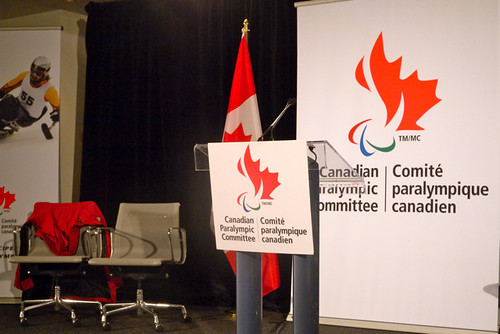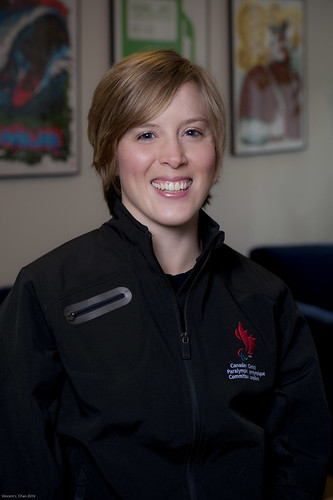Canadian Paralympic Committee Names Elisabeth Walker-Young Assistant Chef de Mission for London 2012
This morning the Canadian Paralympic Committee named four-time Paralympian Elisabeth Walker-Young as Canada’s Assistant Chef de Mission for the London 2012 Paralympic Summer Games.
After captivating our attention in Vancouver last February, the Paralympics have been growing in popularity thanks to the outstanding performances by our athletes. I had the chance to chat with Elisabeth today to find out about her new role assisting Dr. Gaétan Tardif, Chef de Mission, and how things are looking heading into the next Summer Games.
“Gaétan has expertise to bring about what worked before and what didn’t. I have the luxury of being on the athlete side so I get to think about and bring the athlete’s perspective,” said Elisabeth. Along with assisting the Mission staff with budgets and operational issues, she said she can be the voice of the athletes when it comes to everything from the placement of Canada’s building at the Games to the clothing they will wear.
Elisabeth’s Paralympic career began in Barcelona and she brought continued success to Atlanta, Sydney, and Athens in the years to follow. Having won three gold medals, one silver, and two bronze in swimming over her outstanding competitive career, her passion for the Paralympics is clear.
“People ask me (whether it’s media, or friends) ‘which were your favourite Games?’ and I can never pick one because they all bring such different memories. When I was a rookie in Barcelona it was the grandeur of the opening ceremony.” Elisabeth talked about how dedicated she was to her first Games and noted that she was only 15 years old at the time.
Her original goal was to make her Paralympics appearance a “one time thing” however after Barcelona she knew she had to do it again.
Eighteen years after her first competition, Elisabeth is committed to helping our athletes achieve their best and the Canadian Paralympic Committee is aiming to rank within the top eight countries in the next medal count. “I think London will bring a different perspective,” added Elisabeth, looking ahead to 2012. “The one thing that’s really unique to the London Games is that’s where the Paralympic games all began, and I think they’ll use that as a catalyst.”
Back in 1948 Dr. Ludwig Guttmann of Stoke Mandeville Hospital started the competition for war veterans, to be the equivalent to the Olympics. First referred to as the Stoke Mandeville Games, the Paralympic Games opened up to everyone (not just war vets) in 1960.
With Canadian athletes performing so well at the Vancouver 2010 Winter Paralympics, particularly while being on our home soil, there was a spotlight on the Games like never-before. Elisabeth definitely sees that momentum continuing on to the upcoming Summer Games.
“I’ve seen it evolve and every year there’s more and more attention. I think having had it in the home environment with such success it can only continue that snowball effect. I think that’s natural but we as the Canadian Paralympic Committee — as mission staff, as athletes — are still going to have to do the work to keep it in the media’s attention and to keep it in the public’s attention.” Elisabeth said she aims to make it resonate with the public that it’s not all about performance sport, although that is the major component of the Games. “Having been an athlete, I know how hard people train and how much they put into it. There’s so much more with Paralympic sport and the societal benefits that can come out of it can’t be ignored.”
You can follow @CDNParalympics on Twitter for updates leading up to the next Games or add them on Facebook.












